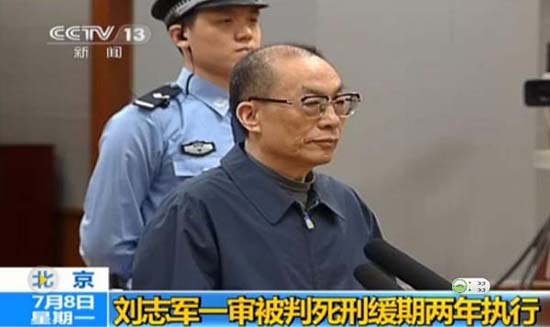
 |
| Video grab shows China's former Railway Minister Liu Zhijun on trial at the Beijing No. 2 Intermediate People's Court in Beijing, capital of China, July 8, 2013. Liu was sentenced to death with a two-year reprieve for bribery and abuse of power, the court announced on Monday. (Xinhua) |
BEIJING, July 8 (Xinhua) -- China's former railways minister Liu Zhijun was given a suspended death penalty on Monday for bribery and abuse of power, making him the highest-ranking official sentenced for such offenses since the country's new leaders took office.
The sentencing shows on one hand the judicial system and top leaders' resolve to target both high-ranking "tigers" and low-ranking "flies" in its anti-corruption efforts, and on the other hand the judicial spirit of everyone is equal before the law.
According to the court verdict, Liu committed criminal offenses even before he served as railways minister, using his official positions in local railway bureaus to help others to win promotions or contracts.
Liu went farther as he rose up the official ranks. When his case was disclosed, he had accepted 64.6 million yuan (10.53 million U.S. dollars) in bribes.
Liu should be severely punished in accordance with the law because his offenses have tarnished the state's image as a clean government and caused colossal losses in public assets.
During the investigation, Liu confessed to his crimes and returned most of his bribed money. These were circumstances that may warrant a lighter punishment.
The sentence reflected the principle of suiting a punishment to the crimes, the criminal policy of combining punishment with leniency.
The people's court held meetings before the trial so as to fully guarantee the right to defense of Liu and his lawyer. A press briefing was also held to satisfy the public's right to know.
The open and fair justice as well as equal stress on substantive justice and procedural justice have led to the sound quality of handling cases, thus safeguarding the spirit of the rule of law and highlighting the development of judicial civilization.
After taking the helm at the Communist Party of China (CPC) in November and then as the country's top leader in March, Xi Jinping called for efforts in fighting corruption, calling on the whole Party to stay on full alert as it is a threat to the Party's survival.
Xi vowed "no exception" when it comes to Party disciplines and law.
Liu's sentence followed the recent sacking and investigation of several senior officials for their suspected violations of law and disciplines.
On the extending list were Liu Tienan, former deputy director of the National Development and Reform Commission, and Li Chuncheng, former vice secretary of the CPC Committee of Sichuan Province.
In the past three weeks, the CPC anti-corruption watchdog announced investigations into three vice ministerial officials, including Guo Yongxiang, former vice governor of Sichuan Province.
The other two officials are Wang Suyi, former head of the United Front Work Department under the Inner Mongolia Autonomous Region's Committee of the CPC, and Li Daqiu, vice chairman of the Guangxi Committee of the Chinese People's Political Consultative Conference.
Many low-ranking officials have also been investigated after social media users exposed alleged corruption.
Among them are Lei Zhengfu, a former official in southwest China's Chongqing Municipality who was embroiled in a sex video scandal and was sentenced to 13 years in jail for bribery in June.
The former railways minister's sentence comes amid a major educational campaign to deal with undesirable work styles such as formalism, bureaucratism, hedonism and extravagance among CPC members to cement Party-people ties.
Ringing a renewed alarm to the 85 million Party members, especially officials, Liu's case reflects the CPC Central Committee's determination to investigate each graft case and punish any corrupt official.
















 Relatives of Chinese victims in Asiana jet crash head for U.S.
Relatives of Chinese victims in Asiana jet crash head for U.S.


![]()
